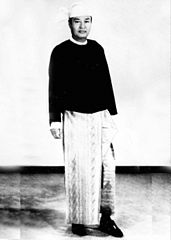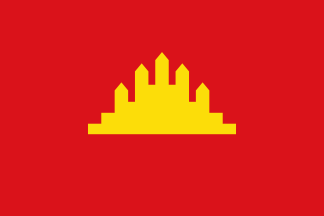Just over 49 years ago on the 29 August 1969 the (former) Burmese Prime Minister U Nu who had been overthrown by General Ne Win and who was detained by General Ne Win and his Revolutionary Council from 2 March 1962 to 27 October 1966 announced in London, that he was still the ‘legal Prime Minister’ of the Union of Burma.
In less than three days the official newspapers of the Revolutionary government carried U Nu’s announcement in full in the original English version in the English language newspapers The Guardian and The Working People’s Daily and in translations in Burmese in all the other Burmese language newspapers.
As some Burmese political aficionados -but not the proverbial Burmese school boys- (should) know the late U Nu’s ‘rebellion’, so to speak failed abjectly and former (rather than ‘legal’) Prime Minister U Nu returned to Burma on 29 July 1980 ‘at the invitation of the President [U Ne Win] … in consideration, recognition and honour of [U Nu’s] leading and distinguished role in the freedom struggle’.
In international law regardless of how a government or a ‘regime’ came into power whether though ‘fake’ elections, military coups, ‘unconstitutional coups’, revolutions etc. if the new authorities have effective control of their territories and receive general ‘habitual obedience’ from the populace the usurpers can and do become the ‘legal’ government.
U Nu might have forgotten or have put in abeyance the unpalatable fact that within days of the Revolutionary government’s takeover in March 1962 many other countries including but not limited to the United States, United Kingdom and the Peoples’ Republic of China did recognize General Ne Win’s new Revolutionary Council (the legislative ‘arm’ of the new regime) and his new Revolutionary government (its executive arm).

Relatedly, international practice since perhaps the early 20th century until a few decades ago is that when a new ‘revolutionary’ or ‘usurping’ (depending on one’s perspective) authority comes into power through irregular, unconstitutional or revolutionary means other governments issue statements of ‘recognizing’ (or not) the new government.
Since the 1980s and definitely by the early 21st century most countries of the world no longer issued formal declarations of recognition or non-recognition, as the case may be, in relation to the new, revolutionary regimes that came to power. This new international and diplomatic practice is known as the ‘Estrada doctrine’ – named after the Foreign Minister of Mexico who first formulated it in the 1930s.
Countries that adhere to and practice the Estrada doctrine no longer officially issue statements of recognition or non-recognition to new, revolutionary governments that came into power through ‘unusual means’. The international community and observers would have to gauge whether the new, revolutionary regimes or governments are recognized or not from the relations certain countries have with the new revolutionary governments.
Nevertheless the United Nations can also become involved in whether or not to recognize a new ‘revolutionary regime’ which came to power especially when it involved ‘foreign intervention’. A case, though not necessarily a ‘paradigmatic’ one, can be discerned from what occurred in the Southeast Asian region in the 1980s.
After fighting a civil war for several years in Cambodia the Khmer Rouge (Red Khmers) became the victor when its troops entered the capital Phnom Penh on 17 April 1975.
The victorious Khmer Rouge almost immediately emptied the city and started a process which at least one documentary film maker had labelled as ‘Year Zero’. From Year Zero (1975) the Khmer Rouge ruled the country for 3 years and 8 months before the regime was overthrown mainly through a foreign invasion.
On Christmas Day 1978 Vietnam invaded Democratic Kampuchea and Phnom Penh fell to the invading Vietnamese troops and Cambodian ‘resistance fighters’ on 7 January 1979.
After its overthrow, the Khmer Rouge coalesced on the Thai-Cambodian border but from early 1979 the Khmer Rouge controlled less than 10% of Cambodian territory.
Though the Khmer Rouge regime has one of the worst record of basic human rights violations ‘since the end of second World War’ as a 1979 United Nations report stated, and though it controlled less than 10% of Cambodian territory the majority of the international community (though not all; the major exceptions being the Soviet Union and its allies including India) recognized the Khmer Rouge as the ‘legal’ or ‘legitimate’ government of Cambodia.
In fact the United Nations itself through majority vote in the General Assembly rejected the credentials of the new Kampuchean regime which replaced the Khmer Rouge after the Vietnamese invasion. The United Nations from 1979 to 1981 recognized and seated the Khmer Rouge representatives as the ‘legal’ government to represent Cambodia in the world organization.
In contrast when the Taliban were in power in Afghanistan from about October 1996 to November 2001 the United Nations did not recognize it as ‘legal’ government. Albeit the Taliban regime’s human rights record was very bad and recognizing to a certain extent of the subjectivities of ‘ranking’ bad to worse regimes it could perhaps be stated that the Taliban regime was ‘no worse’ than the Khmer Rouge regime.
During the reign of the Khmer Rouge about 1.6 million (out of the then population of about 7 million) Cambodians died as the result of its practices and policies. A United Nations Report in 1999 –in addition to the earlier report of 1979- again asserted that ‘the [Khmer Rouge] regime’s actions led to the deaths of nearly a fifth of Cambodia’s population’.
The total population of Afghanistan during the period of the Taliban rule of roughly 5 years from 1996 to 2001 was around 22 million to 25 million. Bad as the Taliban’s human rights violations were they certainly did not cause the deaths (during their five-year rule) of a fifth (around 4 to 5 million) of the population of Afghanistan as the Khmer Rouge did in Cambodia.
Still, the ostracism against the Taliban regime was such that in the 2000 Sydney Olympics the team from Afghanistan under the Taliban was the only country in the world which could not participate in the Olympics which was attended by 199 countries and territories. Only three countries in the world, namely Saudi Arabia, Pakistan and the United Arab Emirates, recognized the Taliban regime. The United Nations which had recognized and ‘seated’ the overthrown Khmer Rouge regime in its august General Assembly Hall from 1979 to 1981 did not recognize the Taliban regime. In spite of this lack of international recognition, at the height of their power from 1996 to their overthrow in November 2001, the Taliban controlled up to 90% of the territory of Afghanistan.
In the case of the ‘People’s Republic of Kampuchea’ (the new name of the country after the Vietnamese invasion) the regime or government was installed by a foreign power. And that together and equally importantly with the geopolitical situation in Southeast Asia of the 1980s, led a majority of members of the United Nations, in the initial years after the Vietnamese invasion, to reject the People’s Republic of Kampuchea’s government as a ‘legal’ government.

In the case of Afghanistan it was the former Soviet Union which installed an arguably Communist –or at least its ‘satellite’- government after its Christmas 1979 invasion. Within about 7 years after the Soviets’ departure from Afghanistan in February 1989 Kabul again fell to the Taliban in late September 1996. After about five years (mis)rule of Afghanistan in November 2001, the Taliban were overthrown by the ‘Northern Alliance’ much with the help of the United States which started a bombing campaign against the Taliban and in support of the Northern Alliance in October 2001.
Very few regimes shared the ‘designation’ of being formally called ‘illegal regimes’ by the United Nations but one of them was the Taliban. Why was the Taliban regime considered as ‘illegal’ by the United Nations? The geo political situation prevailing in South Asia at that time might be one factor. Another factor in addition could be the Taliban’s appalling human rights violations (though they were arguably as stated above not as ‘costly’ in terms of human lives as the Khmer Rouge’s monstrous record). The Taliban’s systemic and systematic mistreatment of girls and women and violations of their basic human rights might also have led the United Nations to deem the Taliban regime as illegal.
One other regime that shared with the Taliban the anomaly or peculiarity of being formally designated as ‘illegal’ by the United Nations was the Rhodesian white minority regime after its unilateral declaration of independence from Great Britain on 11 November 1965.
In the 1960s and early 1970s UN Secretary-General U Thant himself had in his statements called the Ian Smith white minority Rhodesian regime an ‘illegal regime’. Indeed within 24 hours of the UDI (‘Unilateral Declaration of Independence’) by Ian Smith and imposition of a white minority regime on the black majority in then Rhodesia (Zimbabwe since April 1980) the United Nations Security Council imposed an arms embargo and economic sanctions against it.
The practices (to a large extent in its theories as well) of international law is suffused and oft times linked with power and regional politics as well as the intricacies of diplomacy.
In State and United Nations practice the term ‘legality’ of governments and/or ‘regimes’ is still generally based on the effectiveness of the control of a nation’s territory and the people by those in power. Notwithstanding this reality based slant and practice of international law, governments installed through foreign interventions and those which blatantly ignored the right of self-determination of its peoples have occasionally, perhaps only exceptionally, led the United Nations and the international community to ‘equivocate’ on the traditional implementation of the ‘doctrine of effectiveness’ in not according recognition to new revolutionary governments and/ or ‘regimes’.
Featured image: UN General Assembly panoramic, Wikimedia Commons.
